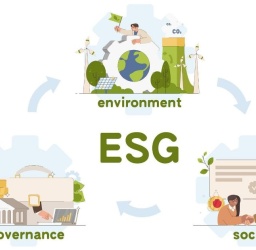European Union Corporate Sustainability Reporting Directive (CSRD)

What is Corporate Sustainability Planning?
Corporate Sustainability Planning is a strategic approach businesses use to operate responsibly in environmental and social aspects while maintaining economic viability. It involves embedding sustainability into core strategies, operations, and culture to create long-term value for the company, stakeholders, and society. This approach aims to ensure long-term profitability and growth by minimising environmental impact, enhancing operational efficiency, and improving brand reputation. It fosters innovation in sustainable products, opens new market opportunities, ensures regulatory compliance and mitigates risks. Additionally, it creates a workplace culture that values sustainability, leading to higher employee satisfaction, engagement, and retention.
Such sustainability planning can be drawn down into five key components:
Environmental Management: Implementing practices that reduce the environmental impact of the company’s operations. This includes reducing greenhouse gas emissions, managing waste, conserving water, and improving energy efficiency.
Social Responsibility: Ensuring the company operates ethically and contributes positively to society. This encompasses fair labour practices, community engagement, and ensuring diversity, equity and inclusion within the workplace.
Economic Viability: Ensuring the company remains profitable and competitive while pursuing sustainability goals. This involves innovative business models, sustainable product development, and long-term financial planning.
Stakeholder Engagement: Actively involving stakeholders, including employees, customers, suppliers, investors, and the community, in the sustainability journey. This involves transparency, regular communication, and incorporating stakeholder feedback into sustainability strategies.
Compliance and Risk Management: Ensuring adherence to relevant regulations and standards, and proactively managing risks associated with environmental and social issues. This includes staying ahead of regulatory changes and anticipating future sustainability challenges.
EXPLORE ALL TRAINING OPPORTUNITIES BY EIMF
What is the EU Doing to Promote Sustainability Planning
The European Union is promoting Corporate Sustainability Planning through various policies and initiatives aimed at fostering responsible business practices and sustainable growth. The EU encourages companies to integrate environmental, social, and governance (ESG) considerations into their business strategies. This includes setting clear sustainability goals, improving resource efficiency, and reducing carbon footprints. The EU supports innovation in sustainable technologies and green finance, offering funding and incentives for businesses to adopt eco-friendly practices. Additionally, the EU emphasises the importance of transparency and accountability, encouraging companies to disclose their sustainability efforts and impacts. By creating a regulatory framework and providing guidance, the EU aims to drive a transition towards a more sustainable and resilient economy.
The Corporate Sustainability Reporting Directive (CSRD)
The CSRD, which came into force on January 5, 2023, represents a significant update to the EU’s corporate sustainability reporting framework and a strong move to hasten the agenda of resilience and sustainability. This directive modernises and strengthens the rules regarding the social and environmental information that companies must disclose. It applies to a wider range of companies compared to its predecessor, the Non-Financial Reporting Directive (NFRD), including large companies, listed SMEs, and certain non-EU companies that generate significant revenue within the EU.
The CSRD aims to provide investors and other stakeholders with the information necessary to assess the impact of companies on people and the environment, as well as to evaluate financial risks and opportunities related to climate change and other sustainability issues. This is achieved through mandatory reporting according to the European Sustainability Reporting Standards (ESRS), developed by the European Financial Reporting Advisory Group (EFRAG) and tailored to align with EU policies while contributing to international standardisation efforts. (More on these below).
EXPLORE ALL TRAINING OPPORTUNITIES BY EIMF
Under the new directive, companies must report on a comprehensive set of sustainability topics, including environmental matters, social and employee issues, human rights, anti-corruption and bribery. Reports must be both qualitative and quantitative, covering past performance and future outlooks, and must be included in the company’s management report, typically part of the annual report. The information provided needs to be verified by an independent assurance service to ensure accuracy and reliability.
The directive also introduces the concept of ‘double materiality’, requiring companies to report both on how sustainability issues impact their business and how their operations affect society and the environment. This dual perspective ensures a more holistic view of a company’s sustainability performance.
The CSRD is expected to affect approximately 50,000 companies, representing around three-quarters of all businesses in the European Economic Area. This includes large companies, listed SMEs (with some transitional provisions allowing opt-out until 2028), and non-EU companies with significant operations in the EU. By harmonising sustainability reporting standards and reducing reporting costs over time, the CSRD aims to facilitate sustainable investment and promote a greener, more resilient economy.
The first companies will need to comply with these new rules starting in the 2024 financial year, with reports published in 2025. This phased implementation allows companies to prepare and adapt to the new requirements, ensuring a smooth transition towards enhanced sustainability reporting.
The European Sustainability Reporting Standards (ESRS)
These standards form a crucial part of the CSRD, setting detailed requirements for corporate sustainability disclosures and are designed to align with EU policies and contribute to global sustainability reporting efforts. They are divided into general standards and those that are topic specific.
General Standards
ESRS 1 | General Requirements:
This standard outlines the overarching principles and concepts for sustainability reporting. It ensures consistency and comparability of reports by detailing the necessary elements and structures that companies must include. It covers the scope of reporting, materiality assessment, and the reporting boundaries, ensuring comprehensive coverage of sustainability impacts and risks.
ESRS 2 | General Disclosures:
This standard mandates the disclosure of general information about the company’s sustainability governance, strategy, policies and targets. It includes requirements for describing the governance structure related to sustainability, strategic integration of sustainability, risk management, and the allocation of resources to achieve sustainability goals.
EXPLORE ALL TRAINING OPPORTUNITIES BY EIMF
Topic-Specific Standards:
The ten topic-specific standards are divided into environmental, social and governance (ESG) categories:
Environmental Standards:
Climate Change: Focuses on reporting greenhouse gas emissions, climate-related risks and opportunities, and the company’s strategy for climate change mitigation and adaptation.
Pollution: Requires disclosure of pollutant emissions, waste management practices, and measures to prevent and control pollution.
Water and Marine Resources: Involves reporting on water usage, management of water resources, and impacts on marine ecosystems.
Biodiversity and Ecosystems: Covers the company’s impact on biodiversity and ecosystems, including habitat conservation and restoration efforts.
Resource Use and Circular Economy: Focuses on efficient use of resources, recycling, and strategies to promote a circular economy.
Social Standards
Own Workforce: Involves reporting on employee-related issues such as working conditions, diversity, inclusion and labour rights.
Workers in the Value Chain: Requires disclosures on the social impact on workers within the company’s supply chain, including fair wages and safe working conditions.
Affected Communities: Covers the company’s impact on local communities, community engagement and social investment.
Consumers and End-users: Involves reporting on product safety, consumer rights and responsible marketing practices.
Governance Standards:
Business Conduct: Focuses on anti-corruption measures, ethical business practices and the integrity of business conduct.
EXPLORE ALL TRAINING OPPORTUNITIES BY EIMF
These standards ensure that companies provide comprehensive, accurate and transparent information on their sustainability performance, thereby enhancing stakeholder confidence and promoting sustainable development. The ESRS is crucial for aligning corporate reporting with EU sustainability goals and facilitating informed decision-making by investors and other stakeholders.
Conclusion
The EU’s Corporate Sustainability Reporting Directive significantly enhances transparency and accountability in corporate sustainability. By standardising reporting and broadening its scope, the directive ensures investors and stakeholders have reliable information, fostering sustainable business practices and driving the EU towards its strong environmental and social objectives.
Share:
Διαβάστε Επίσης
Πρόκειται για εκθέσεις που καταγράφουν με διαφάνεια τις επιδόσεις μιας εταιρείας
Στόχος είναι η συνολική ικανότητα παραγωγής στρατηγικών τεχνολογιών μηδενικών καθαρών εκπομπών
 Ελληνικά
Ελληνικά  English
English


